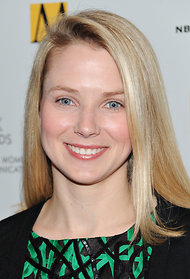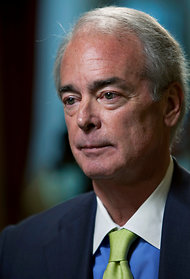 Harry Campbell
Harry Campbell
What makes the perfect chief executive? If the way corporate boards at Yahoo and Duke Energy picked chief executives is any indication, it may be up to chance in large part.
Take Marissa Mayer, the newly appointed chief of Yahoo. She is a Stanford graduate, age 37, and Google’s 20th employee. Until her new gig, Ms. Mayer was one of Google’s stars and helped develop Gmail. She was a well-known face for Google, serving on the board of Wal-Mart Stores, attending White House state dinners and appearing as a regular member of Fortune’s 40 under 40 of the hottest young business executives. In the ultimate sign of tech prominence, she has almost 200,000 Twitter followers.
Why her? According to the tech blog All Things D, she was thought to be a decisive and “disruptive agent of change” pushed by Daniel S. Loeb, the manager of the hedge fund Third Point, which owns about 6 percent of Yahoo. (Third Point disclosed in a regulatory filing on Tuesday that it had purchased an additional 2.5 million Yahoo shares.) Ms. Mayer is also from Google’s technology and product side, an area that Yahoo wants to focus on as it struggles to define itself either as an Internet company like Google or a media company, its main source of revenue.
Deal Professor
View all posts
Ms. Mayer is now the youngest chieftain of a Fortune 500 company. She has no experience running a public company or reorganizing one, something that Yahoo desperately needs. And in her previous job, she had an almost embarrassment of riches in terms of money and people, something that Yahoo lacks, at least on Google’s scale.
The Yahoo board decided to go with youth and decisiveness over experience. In doing so, the company has agreed to pay a package that could exceed more than $100 million over five years if Ms. Mayer works out.
 Evan Agostini/AGOEV, via Associated PressMarissa Mayer, the new chief of Yahoo.
Evan Agostini/AGOEV, via Associated PressMarissa Mayer, the new chief of Yahoo. Scott Eells/Bloomberg NewsJames E. Rogers, her counterpart at Duke Energy.
Scott Eells/Bloomberg NewsJames E. Rogers, her counterpart at Duke Energy.
Is she the right choice? It is hard to know.
There is little solid analysis on what makes an effective chief executive. Most of it is in the form of quasi self-help books like “The 7 Habits of Highly Effective People” and “Good to Great: Why Some Companies Make the Leap … and Others Don’t.” Even these are remarkably vague, often citing factors like being “proactive.” Academic research is also not particularly helpful either, and often looks at youth versus maturity and experience. (Maturity typically wins.)
The consequence of this uncertainty is reflected in the high failure rate of chief executives. According to the Harvard Business Review, two out of five chief executives fail in their first 18 months on the job.
This all makes the choice of a chief executive a product of the board’s vision and personalities rather than one of studied research on what characteristics the person needs.
This creates its own problems, as the drama unfolding in the merger of Duke Energy and Progress Energy illustrates. Directors took only hours after the merger to replace William D. Johnson, the Progress chief who was to run the combined company, with James E. Rogers of Duke.
The reason given in testimony by Ann Gray, the lead director of the combined company, is that Mr. Johnson withheld information about repairs at the company’s nuclear plan in Crystal River, Fla. More tellingly, Ms. Gray testified that the directors thought Mr. Johnson was imperious and that he had described himself to the board as “a person who likes to learn but not be taught,” leading the Duke directors to conclude that their input was not sought.
Both Mr. Johnson and Mr. Rogers are former lawyers who worked in private practice and appeared to graduate at the top of their class. Both also rode successive mergers to be leaders at their companies. They have remarkably similar backgrounds. This dispute can be chalked up to different personalities and cultures rather than finding the best person for the job.
All this suggests that boards picking chief executives are essentially acting on their hunches and reflecting their own biases in their decision-making.
Culture and personality appeared to play a part in Ms. Mayer’s selection as her search was reportedly heavily influenced by Mr. Loeb’s presence. He’s a brash, outgoing hedge fund activist who has made one of the biggest bets in his career with Yahoo. Picking someone like Ms. Mayer, who is known for her decisiveness, will play well with the Silicon Valley crowd, mitigating her negatives of inexperience and perhaps youth. After all, 37 is practically ancient in the hedge fund universe, as it is in Silicon Valley.
Compare this with how the search is likely to have unfolded if Yahoo’s board had viewed itself as a media company. In that industry, top executives come up through the ranks. Leslie Moonves, the chief of CBS, is typical. He’s 62 and has been in the industry almost his entire life. Robert A. Iger of the Walt Disney Company is 61 and is also deeply experienced of the industry. Ms. Mayer would never have come close to being picked.
This all means that the selection of a chief seems more about group decision-making than anything else. And group decision-making can be quite random.
I’m reminded of an exercise I once did at an old law firm retreat run by a group of consultants. We were divided into five groups of 10 people each. Each group was given the same 10 résumés and told to pick the best candidate for an executive position and rank the rest. Not surprisingly, group dynamics took hold and each group selected a different rank and almost all selected a different top pick.
This result is in accord with research on small-group dynamics and decision-making. The selection of executives is influenced by directors’ own biases and backgrounds. Media boards tend to be directors who pick media people of a certain type; similarly with technology boards. This is influenced by a group negotiation process that depends on the people and personalities involved. In the end, these boards tend to pick people who reflect themselves and the world they already know — something that psychologists call the confirmation bias.
The decision to pick a chief executive is often steered by flocks of high-level recruitment consultants. Recruiters are paid millions to have a stable of candidates that they feed to boards, steering the process in pursuit of the board’s sometimes ill-defined wishes. This inherently limits the pool of candidates and further pushes boards to confirm their own biases in any selection.
Ms. Mayer and Mr. Rogers may do terrific jobs at their companies. But their appointments do not necessarily mean that they are the best candidates. Rather, their selection is a result of random and nonrandom factors, something that is anything but a perfect process.
Steven M. Davidoff, writing as The Deal Professor, is a commentator for DealBook on the world of mergers and acquisitions.
Article source: http://dealbook.nytimes.com/2012/07/24/when-picking-a-c-e-o-is-more-random-than-wise/?partner=rss&emc=rss

Speak Your Mind
You must be logged in to post a comment.